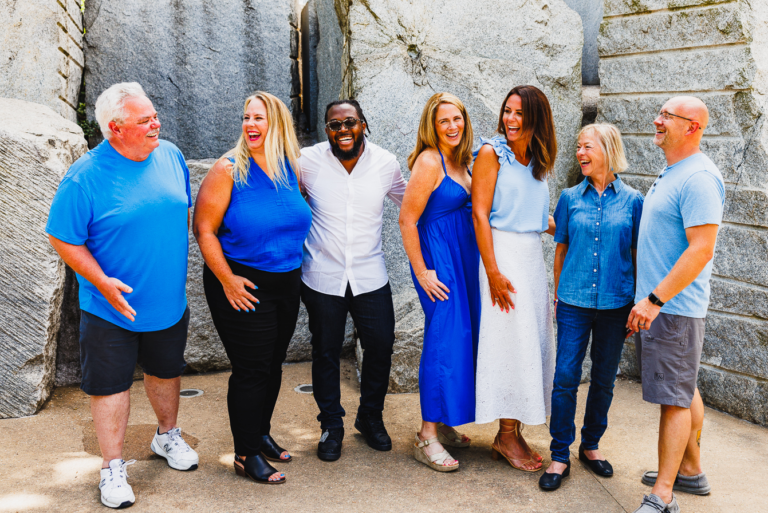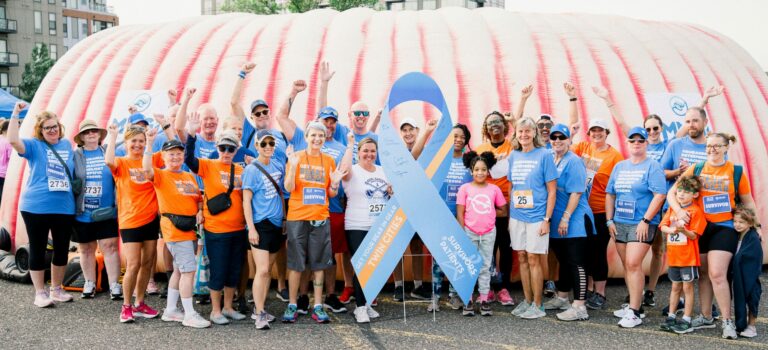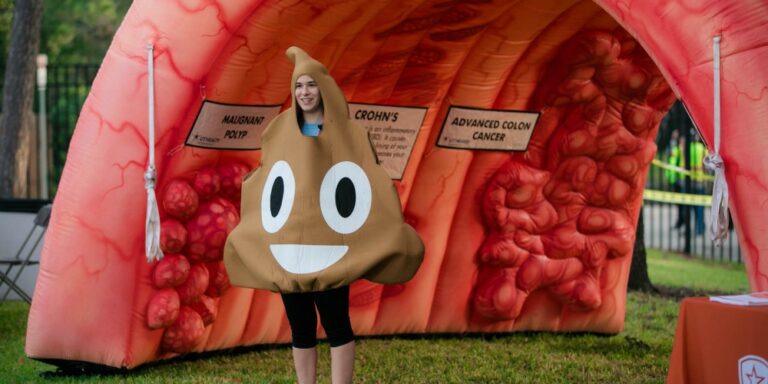
We are grateful to our partners, volunteers, and sponsors for lighting over 200 public and private spaces #BlueForCRC on Tuesday, March 8
Throughout Colorectal Cancer Awareness Month, civic, public, and private buildings and landmarks across the United States are going BLUE (the awareness color for colorectal cancer) in honor of the nation’s colorectal cancer (CRC) community, including over one million colorectal cancer survivors, thanks to support from our partners at Fight Colorectal Cancer, the American Cancer Society, countless volunteers, and support of sponsors Bayer and Natera.
Throughout the month, communities will “go blue” with either lights or awareness efforts. The bulk of landmarks are slated to be blue from dusk to dawn on Tues., March 8. In addition, businesses and health care facilities are encouraging employees and patients to wear blue, share information, and encourage screening for the nation’s no. 2 cancer killer. Highlights include the 35W Bridge in Minneapolis, the Leonard P. Zakim Bunker Hill Memorial Bridge in Boston, George Bush Intercontinental and William P. Hobby Airports in Houston, Downtown Orlando Public Art Displays, and dozens of others. A list of landmarks, public spaces, health care facilities, and other businesses going blue is available at ColonCancerCoalition.org/BlueForCRC.
There is still time to get involved.
Submit a landmark, business, or other facility going blue at any time in March through the form on the webpage. The general public is invited to participate by simply wearing a favorite shade of blue or lighting their home or businesses with blue lights. Photos and the stories behind them should be shared on social media using #BlueForCRC.
 “My mom passed away in August 2020 after being diagnosed with stage IV colorectal cancer in late 2017. While she was undergoing treatment in 2018, my sister was diagnosed with stage IV colorectal cancer and passed just 4 months later. I learned firsthand the importance of awareness, early screening, and patient advocacy, education, and resources, as well as research for effective treatments and cures,” says Jennifer Diamantis, Catonsville, Maryland resident, and a colorectal cancer caregiver and volunteer who coordinated over 20 individual landmarks to be blue all over the country. “My mother would often talk about the many amazing and wonderful people in the colorectal cancer that she met and interacted with, and enjoyed sharing her positive energy and story. My sister expressed a desire for more public recognition and awareness for the disease. I want to honor their memory, spirit, and values by being part of the community that was so important to them and a positive force for advocacy, support, and awareness.”
“My mom passed away in August 2020 after being diagnosed with stage IV colorectal cancer in late 2017. While she was undergoing treatment in 2018, my sister was diagnosed with stage IV colorectal cancer and passed just 4 months later. I learned firsthand the importance of awareness, early screening, and patient advocacy, education, and resources, as well as research for effective treatments and cures,” says Jennifer Diamantis, Catonsville, Maryland resident, and a colorectal cancer caregiver and volunteer who coordinated over 20 individual landmarks to be blue all over the country. “My mother would often talk about the many amazing and wonderful people in the colorectal cancer that she met and interacted with, and enjoyed sharing her positive energy and story. My sister expressed a desire for more public recognition and awareness for the disease. I want to honor their memory, spirit, and values by being part of the community that was so important to them and a positive force for advocacy, support, and awareness.”
The goal of the #BlueforCRC campaign is to show support for patients, survivors, and caregivers and educate Americans about the importance of colorectal cancer screening starting at age 45 for average risk adults.
 “We know that screening rates for colon cancer are slowing improving after the health care shortages as a result of the COVID-19 pandemic,” notes Chris Evans, president of the Colon Cancer Coalition. “But there is a lot of work to be done to reach pre-pandemic levels and to improve on them. We are grateful to our sponsors Bayer and Natera for supporting this awareness effort. By working with our partners at Fight Colorectal Cancer and the American Cancer Society to light the country blue, and by sharing the stories behind volunteers working to light the country blue, we can reach others with the message that Screening Saves Lives and encourage people who may have missed a screening to call their doctors and schedule that important appointment.”
“We know that screening rates for colon cancer are slowing improving after the health care shortages as a result of the COVID-19 pandemic,” notes Chris Evans, president of the Colon Cancer Coalition. “But there is a lot of work to be done to reach pre-pandemic levels and to improve on them. We are grateful to our sponsors Bayer and Natera for supporting this awareness effort. By working with our partners at Fight Colorectal Cancer and the American Cancer Society to light the country blue, and by sharing the stories behind volunteers working to light the country blue, we can reach others with the message that Screening Saves Lives and encourage people who may have missed a screening to call their doctors and schedule that important appointment.”
 “As a colorectal cancer survivor and passionate advocate, I hope that by helping to turn my city blue it will shine a light on the importance of screening. We need that now more than ever,” says Allison Rosen, Houston-resident, colorectal cancer survivor, and volunteer coordinating over 60 landmarks in Houston and the surrounding area. “I do not want to lose another friend to this cancer that is preventable and very treatable if caught early.”
“As a colorectal cancer survivor and passionate advocate, I hope that by helping to turn my city blue it will shine a light on the importance of screening. We need that now more than ever,” says Allison Rosen, Houston-resident, colorectal cancer survivor, and volunteer coordinating over 60 landmarks in Houston and the surrounding area. “I do not want to lose another friend to this cancer that is preventable and very treatable if caught early.”
“Advocates look forward to the #BlueforCRC initiative every March so they can raise awareness of colorectal cancer through asking elected officials to issue a state proclamation for Colorectal Cancer Awareness Month and getting local leaders to light up their landmarks in blue,” said Anjee Davis, President of Fight Colorectal Cancer. “We are proud to collaborate with the Colon Cancer Coalition every year to turn our country ‘Blue for CRC.'”
COLORECTAL CANCER FACTS TO SHARE
- In 2021, the recommended age for routine colorectal cancer screenings was lowered from 50 to 45.
- 1 in 24 Americans will be diagnosed with colon or rectal (colorectal) cancer during their lifetime.
- 51% of adults 50-54 have not been screened.
- Colonoscopy screening can prevent colorectal cancer.
- 1 in 5 colorectal cancer patients are 20-54 years old.
- Adults born in the 1990s have 2x the risk of colon and 4x the risk of rectal cancer than those born in 1950.
- By 2030, colorectal cancer is projected to be the #1 cause of cancer death in adults under 50 years of age.



